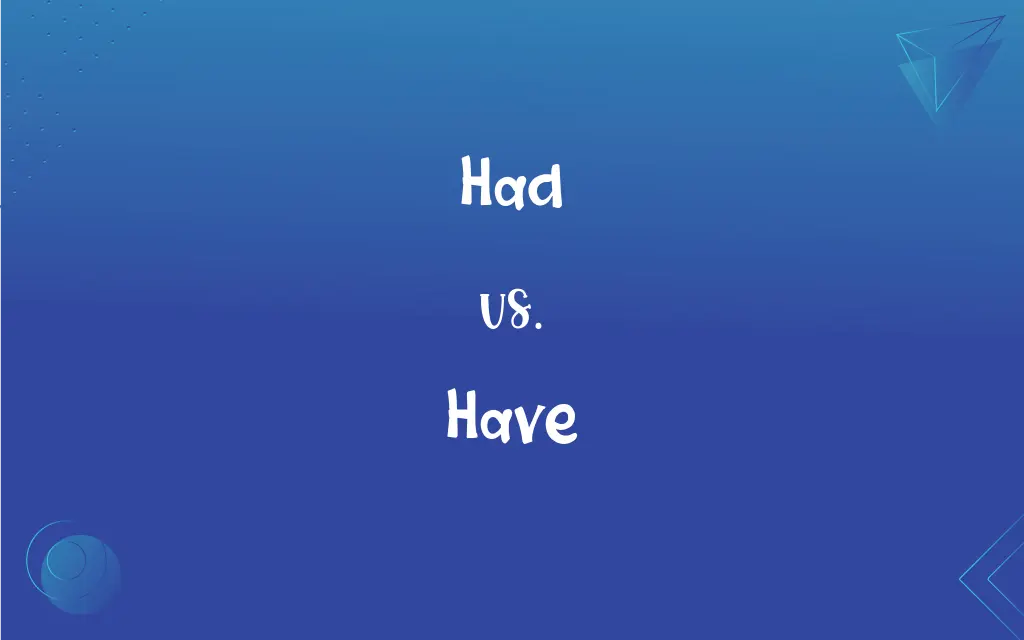Had vs. Have: What's the Difference?
Edited by Aimie Carlson || By Janet White || Published on December 15, 2023
"Had" is the past tense of "have," indicating past possession or action; "have" is present tense, denoting current possession or necessity.

Key Differences
"Had" is the past tense and past participle form of "have." It is used to indicate possession, necessity, or action that occurred in the past. For instance, "She had a car" implies ownership in the past. Conversely, "have" is the present tense form, used for current possession, necessity, or action. An example is "I have a car," signifying present ownership.
In terms of grammatical structure, "had" often appears in past perfect tense constructions, as in "They had finished the project before the deadline." This usage indicates a completed action in the past before another past action. On the other hand, "have" appears in present perfect tense, such as in "They have finished the project," which refers to a recently completed action with relevance to the present.
"Had" is also used in hypothetical or conditional statements, often following "if" or "wish," to denote unreal situations in the past. For example, "If I had known, I would have acted differently." In contrast, "have" can indicate obligation or necessity in the present, as in "You have to complete your work today."
In questions and negatives, "had" is used without an auxiliary verb in the past perfect, like "Had you ever seen such a thing?" Meanwhile, "have" in the present perfect or present simple requires an auxiliary, as in "Have you seen my keys?" or "I do not have my keys."
"Had" can also function as an auxiliary verb in past perfect continuous tense, exemplifying duration before a point in the past: "They had been waiting for hours." "Have," as an auxiliary, is used in present perfect continuous, as in "They have been waiting for hours," highlighting the duration of an action continuing into the present.
ADVERTISEMENT
Comparison Chart
Tense
Indicates past action or possession.
Indicates present action or possession.
Example in Sentence
"I had a great time yesterday."
"I have a great time whenever I go there."
Use in Perfect Tenses
Used in past perfect tense.
Used in present perfect tense.
Conditional Forms
Used in hypothetical or past conditions.
Used for present conditions or obligations.
Question Formation
Used without auxiliary in past questions.
Requires auxiliary in present questions.
ADVERTISEMENT
Had and Have Definitions
Had
Indicates past necessity.
He had to finish his homework by evening.
Have
Used in present perfect tense.
They have completed the project.
Had
Past tense of have.
She had a dog when she was a child.
Have
Expresses obligation or necessity.
You have to finish your assignment.
Had
Expresses a condition in the past.
If I had known, I would have told you.
Have
Indicates present possession.
I have a book.
Had
Used for wishes about the past.
I wish I had gone to the party.
Have
Used to describe experiences.
I have been to France.
Had
Used in past perfect tense.
They had left before we arrived.
Have
Forms the present perfect continuous tense.
We have been waiting for an hour.
Had
Past tense and past participle of have.
Have
To be in possession of
Already had a car.
Had
Simple past tense and past participle of have|cap=1.
This morning I had an egg for breakfast.
A good time was had by all.
Have
To possess as a characteristic, quality, or function
Has a beard.
Had a great deal of energy.
Had
Used to form the past perfect tense, expressing an action that took place prior to a reference point that is itself in the past.
I felt sure that I had seen him before.
Had
As past subjunctive: would have.
FAQs
When do I use 'had'?
Use 'had' for actions or situations in the past, especially in the past perfect tense.
Is 'have' used in perfect tenses?
Yes, 'have' is used as an auxiliary verb in present perfect tenses.
Can 'had' be used in conditional sentences?
Yes, 'had' is often used in conditional or hypothetical sentences about the past.
How do I form a question with 'have'?
Form questions with 'have' by using auxiliary verbs, like "Have you seen my book?"
Is 'had' used in the past perfect continuous tense?
Yes, 'had' is used as an auxiliary verb in past perfect continuous constructions.
Can 'have' be used as a main verb?
Yes, 'have' can function as a main verb indicating possession.
Is it correct to say "I had a cold last week"?
Yes, this is a correct use of 'had' to indicate past possession or state.
Can 'had' indicate a past necessity?
Yes, 'had' can express a necessity or requirement that existed in the past.
What does 'have' mean?
'Have' indicates present possession, experience, or obligation.
Is 'had' used in subjunctive moods?
Yes, 'had' is used in subjunctive forms, especially in wishes or hypotheticals about the past.
Can 'have' be used to talk about obligations?
Yes, 'have' is often used to express obligations or duties in the present.
Can 'have' indicate experiences?
Yes, 'have' is often used to talk about life experiences, as in "I have traveled to Japan."
What is the difference between 'had' and 'have' in negatives?
'Had' is used without auxiliary verbs in negatives for past perfect, while 'have' needs an auxiliary in present tense.
How do 'had' and 'have' differ in auxiliary use?
'Had' is used as an auxiliary verb in past perfect tenses, while 'have' is used in present perfect tenses.
Can 'had' be omitted in some sentences?
In informal language, 'had' can sometimes be omitted, but it's generally necessary for clarity.
How is 'had' used in the past perfect tense?
'Had' is used with the past participle of a verb to form the past perfect tense.
Is 'have' used in forming present perfect continuous tense?
Yes, 'have' is used with 'been' and the present participle to form this tense.
When is 'have' used in questions?
'Have' is used in questions about present possession, experiences, or obligations.
Can 'had' express regret about the past?
Yes, 'had' is often used in expressing regrets about past actions or situations.
Is 'have' used in idiomatic expressions?
Yes, 'have' appears in many idiomatic expressions like "have a good time."
About Author
Written by
Janet WhiteJanet White has been an esteemed writer and blogger for Difference Wiki. Holding a Master's degree in Science and Medical Journalism from the prestigious Boston University, she has consistently demonstrated her expertise and passion for her field. When she's not immersed in her work, Janet relishes her time exercising, delving into a good book, and cherishing moments with friends and family.
Edited by
Aimie CarlsonAimie Carlson, holding a master's degree in English literature, is a fervent English language enthusiast. She lends her writing talents to Difference Wiki, a prominent website that specializes in comparisons, offering readers insightful analyses that both captivate and inform.






































































